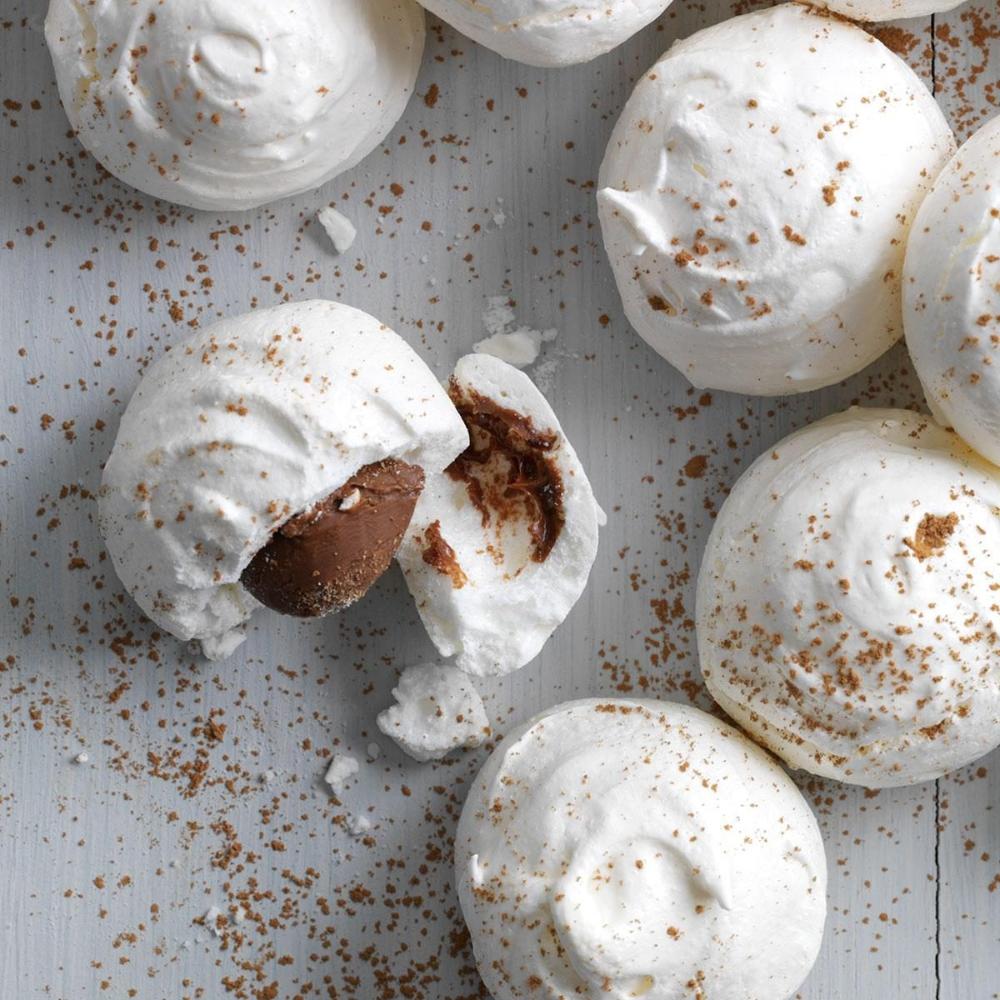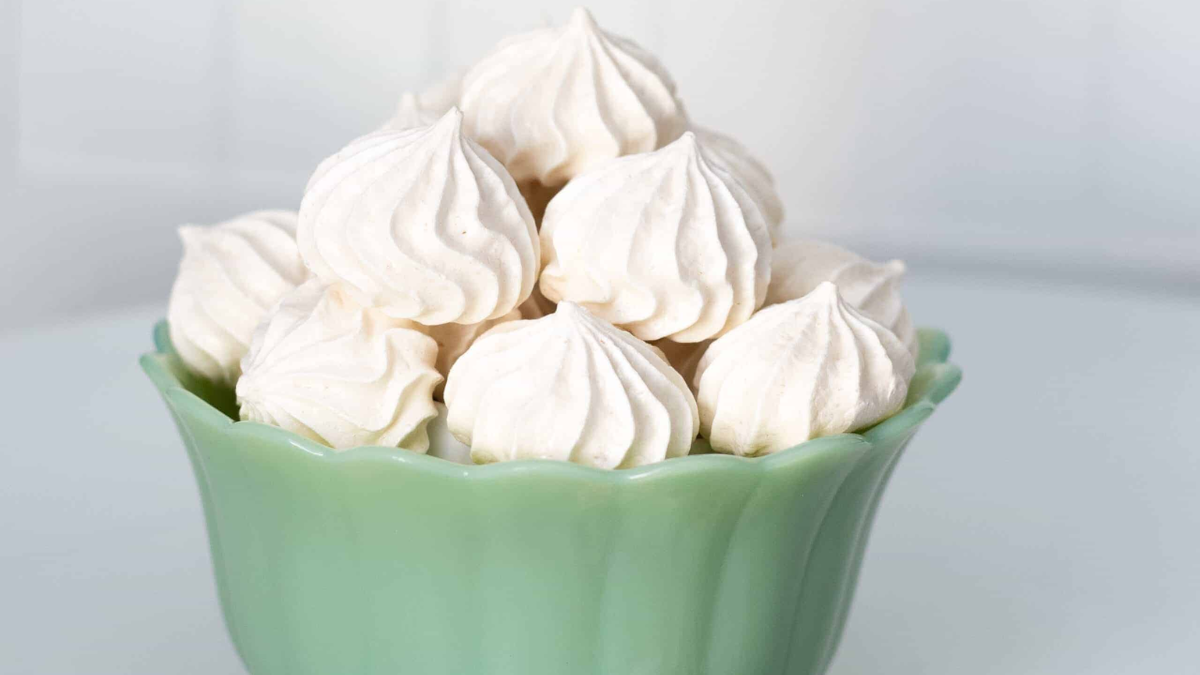The most delicious meringue cookies are made with just four ingredients – egg whites, sugar, cream of tartar, and vanilla extract. Vanilla will make your meringues less white, but it will not ruin the taste. Other flavorings such as lemon juice and white vinegar can also be substituted. Before you start baking, follow the instructions carefully, and take note of any baking tips.
You’ll also need a cream of tartar to help stabilize the egg whites and help them achieve stiff peaks. Vanilla will add flavor, and salt will balance the sweetness. To make the best meringue cookies, preheat your oven to 225 degrees F and line a large baking sheet with parchment paper. Then, beat the egg whites with a mixer until stiff peaks form. Add the vanilla extract and salt and beat for at least 30 minutes.
What is Meringue?
Meringue is a popular dessert in Italian, Swiss, French, and Polish cuisines. Egg whites and sugar are the materials you’ll need to make meringue. Acidic substances such as lemon juice or cream of tartar can also be used. These ingredients help to stabilize the egg whites, resulting in greater peaks after they’ve been beaten.
You can also flavor your meringue using flavorings. Vanilla essence, cocoa powder, nutmeg, and cinnamon are typical additions. Depending on the procedures employed to produce the meal, you can find this dessert in various forms. A bain-marie is used to prepare the meringue for a floating island dish (île flottante in French). Meringue is partially baked when used as a topping. Finally, this dessert can be baked on its own. You’ll get a crisp shell with a softer center in these cases.
How to Make the Best Meringue Cookies?
These light meringue cookies have an impeccable texture and even better flavor.
Ingredients
4 (1 cup) egg whites
¾ cup granulated sugar
½ teaspoon vanilla extract
Two teaspoons of cream of tartar
Directions
- Begin the recipe by pouring the egg whites into a large mixing bowl, then whisking them for 5 minutes until they form stiff peaks
- Add the granulated sugar ¼ cup at a time, every 10 seconds, while the electric whisk is spinning.
- Add the vanilla extract and cream of tartar, then mix again until the batter forms stiff peaks.
- Fill a piping nozzle and pipe swirls (2-inch width) onto a baking paper. Make sure that you pipe the cookies 1 inch apart.
- Bake the meringues at 225 F for 1 hour, then leave the oven door open for 2 hours for them to dry out further.
- Serve and enjoy.
Common Mistakes to Avoid When Making Meringue
Here are some common mistakes to avoid while making meringue cookies:
Adding the Sugar too Quickly
Have you ever tried to make a souffle only to have it deflate? It’s because the egg white proteins are the sole thing keeping the batter together. Sugar interacts with the same proteins in a meringue, resulting in a more stable structure, which is why a correctly produced meringue is considerably firmer than an ordinary egg foam.
In general, an equal weight of egg whites can absorb up to an equal weight of sugar, but you can’t just throw it all in at once, or the foam will be deflated.
Skipping the Cream of Tartar
A moderate acid will aid in the volume and structure of your meringue, allowing it to inflate more fully and keep the air for longer. It won’t take much: roughly a quarter teaspoon of cream of tartar per two to three egg whites should suffice.
Lemon juice can also be used, and a half teaspoon of lemon juice will provide the same amount of acid as a quarter teaspoon of cream of tartar. Apart from making meringues, cream of tartar is useful in the kitchen since it can be used to manufacture your baking powder.
Using a Dirty Bowl
No one is criticizing your dishwashing abilities here. Still, even the tiniest bit of egg yolk on the inside of your bowl or even a speck of oil can prevent your egg whites from foaming properly, no matter how vigorously you beat them.
It’s worth noting that the whip attachment is the same way. As a result, separate the eggs one at a time into a small basin and then add the egg whites to the larger mixing bowl separately.
Not Bringing Eggs to Room Temperature
If you start with room-temperature egg whites, you’ll get a better, more airy meringue. Many people may leave their eggs out for 10 to 15 minutes, or even 30 minutes, which is preferable to use them straight from the fridge, but for the greatest results, leave your egg whites out for an hour.
Because it’s simpler to separate cold eggs, your best chance is to do so while they’re still chilly and then bring the whites to room temperature. When separating your eggs, be careful because even a trace of yolk can prevent your whites from reaching peak firmness.
Beating the Egg Whites for too Long
One of the most typical mistakes is not beating the eggs long enough or at a moderate enough speed, resulting in sloppy droopy egg whites rather than stiff peak egg whites.
However, if you beat them too long, the whites will eventually lose their peak rigidity and become gritty. The curdled milk texture is dry and somewhat lumpy, unappealing both aesthetically and functionally. There’s no turning back now.
How to Prevent Meringue from Shrinking?
Here are the points to prevent the meringue from shrinking:
- Separate three egg whites; then allow the egg whites to become room temperature before beating.
- Whip the whites to a soft peak, and then add a pinch of salt and six tablespoons of powdered sugar. Add sugar gradually, 1 or 2 tablespoons, while beating continuously.
- Beat until sugar is dissolved and meringue appears glossy and forms stiff peaks.
- Add 1/4 tsp. of cream of tartar and beat just enough to mix thoroughly. Do not overbeat.
- To check if the sugar is completely dissolved, rub a little of the meringue between your fingers. It should feel smooth and not be gritty.
- Spread the meringue over the top of the hot pie filling, making sure it is touching the crust around all the edges.
- With the back of the spoon, swirl the meringue and pull it up to form decorative peaks in the meringue.
- Bake the meringue at 350° F. for approximately 15 minutes or until it is lightly browned. Watch carefully so that it does not brown too quickly.
Why is My Meringue Chewy?
Many elements influence the success of your meringues, and any one of them going wrong can result in chewy meringues. While certain recipes call for chewy meringues, the majority of the time, you want a fluffy texture.
The texture of your meringue can be affected by several factors.
Improper Baking
Meringues demand extreme precision throughout the entire process, including the baking stage. They’re usually baked at low temperatures for a longer time to dry out the meringues and give them a fluffy, crisp texture. Your meringues will turn chewy if you bake them at the wrong temperature or for an improper period. One of the most common mistakes bakers make while making meringues is underbaking them, allowing them to dry out too quickly.
Poor Mixing Technique
Mixing is the most important aspect of a meringue’s success. The egg whites are whisked until stiff peaks form, giving the meringue its distinctive texture.
However, a meringue contains so few ingredients, so there is even less room for error when combining. If you don’t correctly prepare your meringues before baking them, you’ll have various problems in the oven, including a chewy texture.
Most inexperienced meringue bakers make the error of mixing their meringues for too short a period. Before piping out your meringues, they should be at very stiff peaks.
Too Much Moisture
When it comes to meringues, moisture is one of the major sources of chewiness. Perfect crispy meringues can only be made when all of the moisture in the mixture is drawn out during the baking process, which may never happen if there is too much moisture, to begin with.
Due to faults made during the preparation process, too much moisture is sometimes injected. The egg whites will not whisk up correctly if your mixing bowl is slightly damp. If possible, use an aluminum bowl that has been properly cleaned and dried.
How to Store Meringue?
Unlike an almond sour cream cake, which must be kept refrigerated, meringue is a treat that does not easily spoil. If you store it properly, you may leave it at room temperature, and it will stay fresh or safe to eat.
Meringues will keep for around two weeks if kept at room temperature. Meringues don’t need to be refrigerated at all.
It’s critical to store meringue in an airtight container if you leave it out at room temperature, and this will keep moisture from damaging the meringue’s silky texture. Meringues can become soggy if they are exposed to moisture.
Ceramic containers, in my experience, aren’t the greatest for preserving meringues because their porous design enables air to get inside, ruining the texture.
If you have a tiny jar for storage, it’s fine to stack meringues. Ensure enough space on the top of the lid to avoid crushing the meringues. Keep in mind that meringues are incredibly delicate, and even a minor bump can cause them to disintegrate.
When stacking meringues, I normally use parchment paper. To preserve the top portion of the cookies, I also place more parchment paper beneath the lid.
Place the container in the coolest part of your kitchen after shutting the lid. Make sure the location is out of direct sunlight.
Conclusion
To begin making a meringue, gather your ingredients: egg whites and sugar. Castor sugar is typically used to form a meringue, and this sugar is less delicate than confectioners’ sugar but more delicate than granulated sugar. If castor sugar is unavailable, granulated sugar can be used. Castor sugar can also be made simply by blending normal sugar for a few seconds.
Mix the egg whites until they are stiff and foamy. Egg whites can be combined by hand or with an electric mixer. Once your egg whites are thoroughly combined, add any acidic components. Once you’ve learned more about meringue, it’s a reasonably simple dish to cook and preserve. The best way to store your meringue is to use the right container! For optimal results, store this baked dessert in an airtight container. When it comes to meringue-topped pies, the best results come from finishing them within two days!
https://youtu.be/4zpYwmi8Jrc


